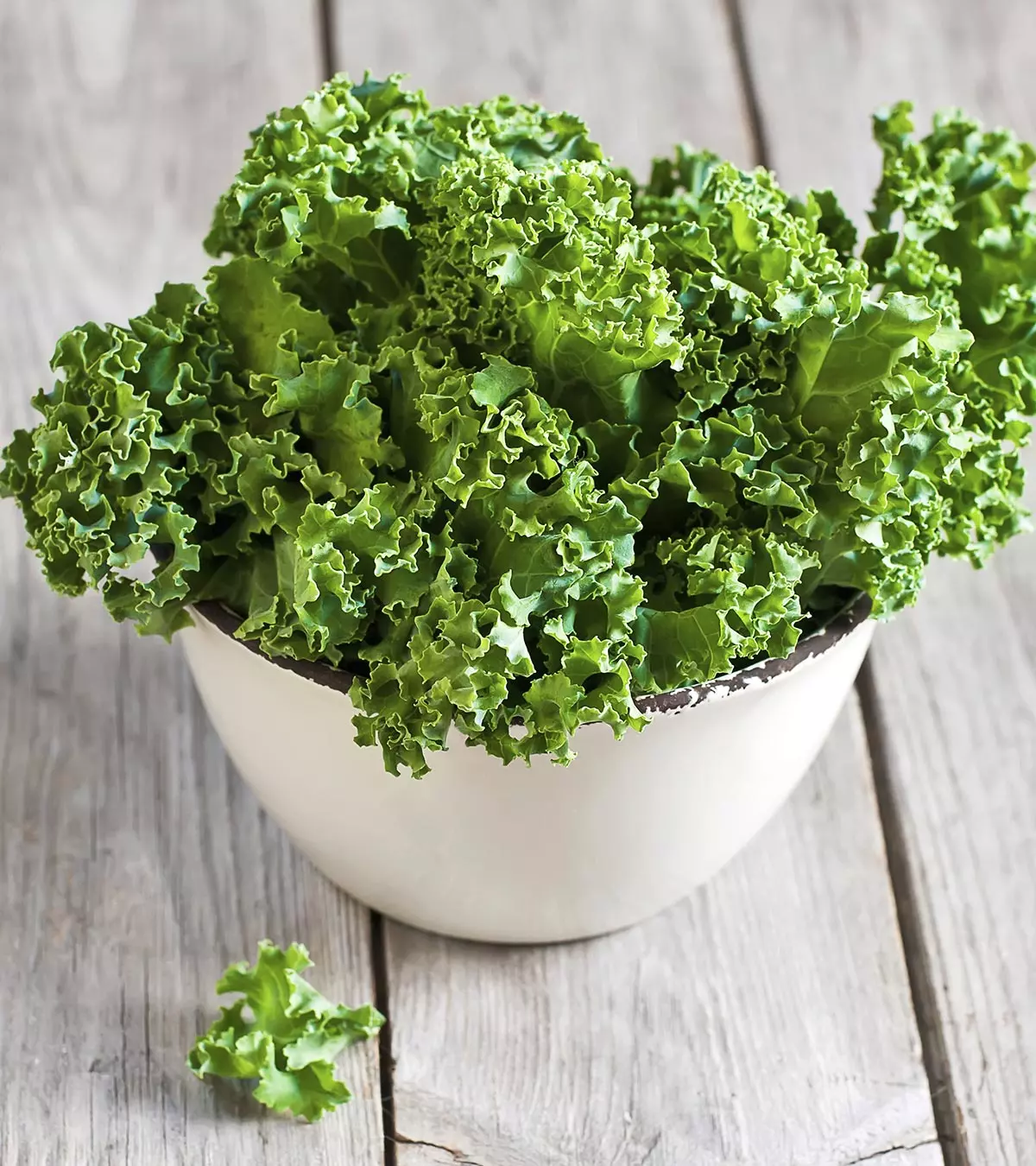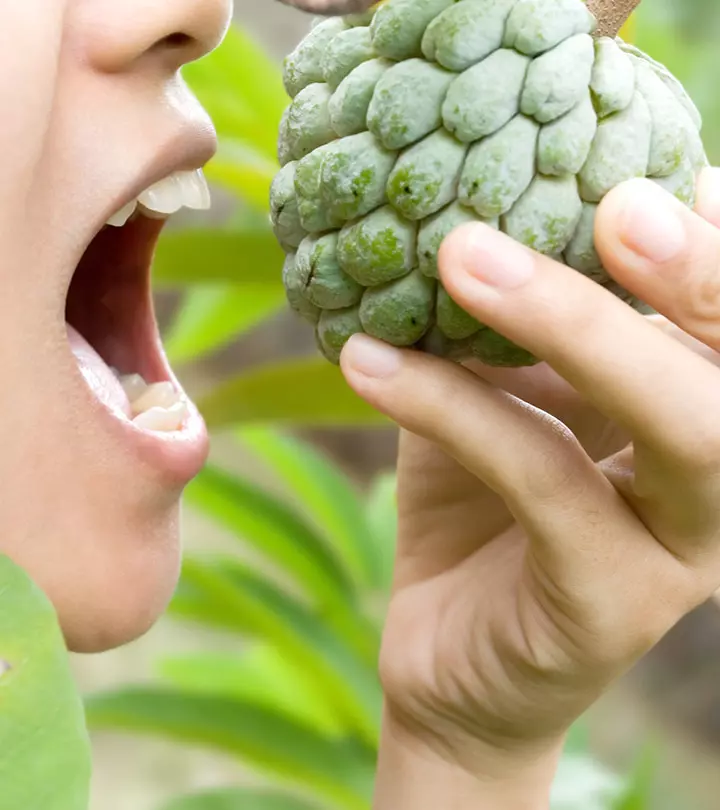
Image: ShutterStock
Having custard apples during pregnancy is a healthy choice. It is a seasonal fruit that you would not want to miss. This fruit is a healthy and nutritious choice for both you and your baby. This fruit has its origins in South America and is traditionally known as cherimoya in that part of the world. These fruits are also known as Sharifa, sitaphal, and sugar apple in other parts. Keep reading this post to know the benefits of having custard apples or sitafal during pregnancy. We also present you with the techniques you can use while eating this fruit and a few delicious recipes that you can try making with it.
Key Pointers
- Moderate consumption of custard apples is safe during pregnancy.
- Custard apples are rich in fiber, minerals, vitamins, antioxidants, and natural sugars, making them highly beneficial in pregnancy.
- To avoid any negative impact on pregnancy, refrain from consuming unripe custard apples and custard apples along with their seeds.
- To use custard apples during pregnancy, choose ripe ones with pale green skin, cut them in half, scoop out the flesh using a spoon, and consume after removing the seeds.
- Custard apple milkshakes and ice cream are simple and delicious recipes that can be included in a pregnancy diet to incorporate custard apples.
Is It Safe To Eat Custard Apple During Pregnancy?

Image: IStock
Is custard apple good for pregnancy? Here’s the answer! Custard apple is considered safe during pregnancy due to its diverse nutritional profile and nearly negligible side effects on moderate consumption.
The nutrient-rich fruit has good amounts of fiber, magnesium, iron, vitamin B6, and vitamin C (1). Also, it has natural sugars that could be helpful for underweight pregnant women to gain weight. Regular consumption of custard apple is believed to lower the risk of abortion.
This fruit is generally palatable even when you develop a distaste for other foods, a common tendency during pregnancy. However, you should not overeat the fruit, just like any other food.
What Are The Benefits Of Eating Custard Apple During Pregnancy?
According to Singapore-based obstetrician and gynecologist Dr. Tan Poh Kok, “Custard apple is rich in vitamins, especially vitamin C, and minerals like magnesium and potassium, which can support a healthy pregnancy. However, like any fruit, moderation is key, as overconsumption can lead to excessive calorie intake and unnecessary weight gain.”
The fruit is sweet, tasty, and safe to eat during pregnancy. But this does not end here. It is one of the many best fruits to eat in pregnancy, provided you eat it in moderation.
1. Vitamins
A custard apple contains vitamins A, B6, and C (2), which are essential for fetal development
. Vitamin A helps keep your eyes, skin, and hair healthy, while vitamin C could help fight off the free radicals in the body. Vitamin B6 may help alleviate nausea (3).
2. Calories
100g of custard apple provides approximately 101Kcal (4). These calories help you add to your daily caloric requirement.
3. Copper
The daily requirement of copper during pregnancy is 100mg (5), and custard apple contains this mineral in fair amounts.
 Quick fact
Quick fact4. Fiber

Image: IStock
The high fiber content in custard apples can help ease bowel movements and lower the chances of constipation and other digestion-related problems. However, you should not overconsume the fruit to get these benefits.
5. Antioxidant
Custard apples have potent antioxidants that could possibly help fight free radical damage (6).
6. Magnesium
Magnesium protects you from cardiac problems and aids in muscle relaxation. 100g of custard apple contains 18mg of magnesium, against the RDA of 450mg for a pregnant woman (7).
7. Expectorant
Custard apple is believed to have some medicinal properties due to the presence of phytochemicalsiBioactive compounds in plants with antioxidant and antimicrobial properties. such as terpenesiAromatic chemicals found in certain plants. , phenolic and flavonoidiNatural compounds found in vegetables and fruits that have varying phenolic structures and provide a variety of health benefits. compounds (8). It is also believed that the fruit has coolant, stimulant, and expectorant properties, which may help address diarrhea and dysentery.
 Health facts
Health factsIn addition to these nutrients, custard apples also contain other nutrients. The following table shows the nutritional values per 100g of custard apple:
| Name | Amount | RDA (per day) |
|---|---|---|
| Water | 71.5g | – |
| Energy | 101KCal | – |
| Fiber,total dietary | 2.4g | – |
| Calcium, Ca | 30mg | 1000mg |
| Iron, Fe | 0.71mg | 27mg |
| Magnesium, Mg | 18mg | 360mg |
| Phosphorus, P | 21mg | 700mg |
| Potassium, K | 382mg | 2900mg(AI) |
| Vitamin C, total ascorbic acid | 19.2mg | 85mg |
| Vitamin A, IU | 33 | 2567IU |
| Vitamin B-6 | 0.221mg | 1.9mg |
Source: Fooddata Central (4), RDA (5)
Can a fruit with such nutritional values be completely safe or can it harm you in any way?
When Can Custard Apple Be Harmful?
There are no clinical indications regarding the safety of custard apples during pregnancy. Here are some general beliefs.
- Unripe fruit may irritate your stomach leading to digestion problems. So, consume only a fully grown, soft, and plump custard apple.
- Do not consume seeds as they might disturb your health.
- If you have gestational diabetes, avoid taking the fruit as it is high in sugars.
How Do You Eat A Custard Apple?
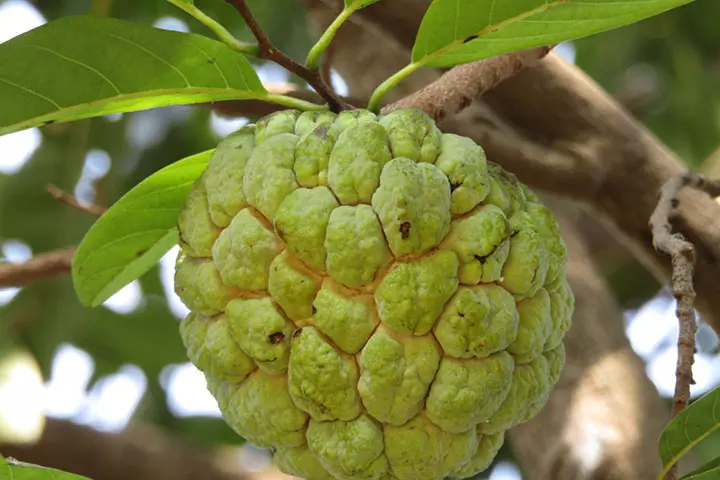
Image: IStock
Know the right technique to remove the pulp to eat the fruit easily.
- Open the fruit using your hands or cut it to half.
- Take a spoon and scoop out the flesh.
- Sometimes the flesh closest to the skin and the central spine may taste a little bitter.
Selecting the best fruit:
Ripe custard apples have pale green skin. They are slightly soft when pressed and have a sweet aroma. You can also buy darker green fruits and store them at room temperature to ripen. Be sure to wash the fruit thoroughly before eating to remove any pesticides or contaminants.
 Caution
CautionSince you know the answer to the question ‘can pregnant women eat custard apple?,’ here are some ways you may eat custard apples during pregnancy.
- Add a little lime juice for a complementary flavor.
- Make it as a dessert and add a handful of nuts.
- Prepare a smoothie, milkshake or add to ice cream.
- Add some honey instead of sugar, if you have a sweet tooth. You may also try brown sugar. However, custard apples in itself are sweet and you may not need a sweetner.
If you are bored of eating whole fruits, you may also make some delicious recipes for an immunity boost.
Simple Recipes With Custard Apple
1. Custard apple milkshake
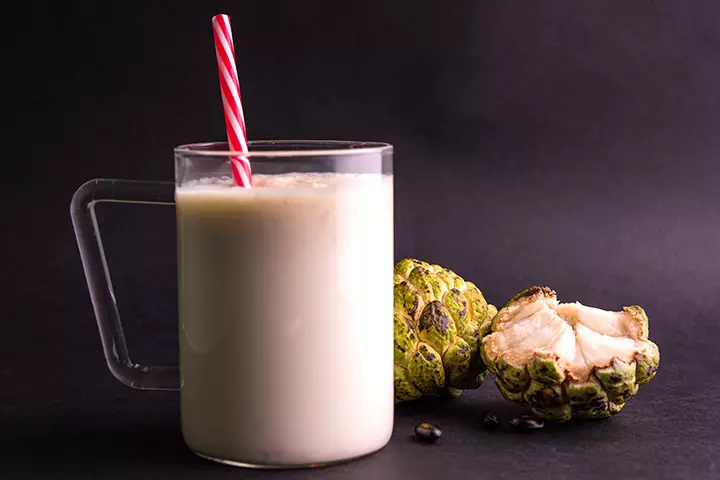
Image: Shutterstock
You will need:
- Custard apple – 3 medium
- Skimmed milk – 4 cups
- Brown sugar – 3tsp
- Fresh cream – 2tbsp
- Ice cubes – As required
How to:
- Extract the pulp from custard apples, and remove the seeds.
- Blend the pulp, milk, cream, sugar and ice cubes until you get a smooth consistency.
2. Custard apple ice cream

Image: Shutterstock
You will need:
- Custard apple – 3 to 4 cups pulp
- Skimmed milk – 2 cups
- Milk powder – 1 cup
- Powdered brown sugar – 1/3 cup
- Fresh cream – 1/2 cup
- Vanilla essence – 1 tsp
How to:
- Mix milk, milk powder, sugar powder, fresh cream, and vanilla essence in a large bowl, and stir well until the sugar dissolves.
- Add custard apple pulp and mix again.
- Pour the mixture into a shallow container, cover, and freeze until it is set.
- Blend the mixture until you get a smooth consistency.
- Put the mixture again in the shallow container, cover, and freeze.
- Eat it either plain or top it with dry fruits.
Note:
Choosing the right ingredients is important during pregnancy. Small changes like replacing full cream milk with skimmed milk or castor sugar with brown sugar could help maintain health.
Frequently Asked Questions
1. Can I eat the seeds of custard apple?
Swallowing a seed or two will not harm you as your body flushes them out in stool. However, in general, custard apple seeds have abortifacientiRelated to something that can cause an abortion. properties and are thus mildly toxic.
2. Can I eat custard apples during periods?
A decoction made from custard apple leaves is said to support blood flow during periods. However, there are no clinical studies to establish a link.
3. Can I eat custard apples if I have gestational diabetes?
Custard apples are rich in sugars, and can only be taken in limited amounts when diabetes is under control. It has a moderate glycemic index (9) and avoiding it completely is not required. In any case, an expectant woman with diabetes during the gestation period must eat fruits (any) in moderate amounts.
4. Can I eat custard apples during a cold?
It is believed that custard apple is a cooling fruit. However, that does not mean it can cause a cold.
5. Are there any side effects of eating custard apples?
There are no scientifically proven side effects of eating custard apples. However, as with all foods, eat them in moderation.
6. When should I not eat custard apple?
If you suffer from Irritable Bowel Syndrome (IBS), you must avoid foods with high fructose levels or high FODMAP (fermentable oligosaccharides, disaccharides, monosaccharides, and polyols) foods. Custard apples are high FODMAP food and hence should be avoided (11).
7. Is custard apple beneficial for women with PCOS?
A custard apple is sweet. It is a healthy option for satiating sweet cravings. This might be beneficial for women with PCOS as they can reduce their processed sugar intake and thus keep their weight in control. However, this has no scientific evidence.
8. Can I have custard apple at night?
Anecdotally, it is believed that custard apples may have a cooling effect on the body. Hence, if you tend to catch a cold quickly, you might want to avoid eating custard apples at night. However, this is not medically proven.
Sugar apple, Sitaphal, or custard apple during pregnancy is healthy for both the mother and baby. This tasty fruit is rich in antioxidant vitamins and minerals, such as copper, magnesium, and fiber. The sugars may help underweight women gain healthy pregnancy weight. It is also believed to lower miscarriage risk. Sitaphal may be eaten after discarding the seeds or made into a milkshake or ice cream. However, avoid custard apples in pregnancy if you have gestational diabetes. Further, consuming the raw fruit may cause an upset stomach. Have custard apples in moderation to reap its benefits while avoiding the side effects.
Infographic: Advantages Of Including Custard Apple In Your Pregnancy Diet
Custard apples can be a nutritious and delicious addition to a pregnant woman’s diet. They are a good source of essential vitamins and minerals and can benefit the mother and the developing baby. If you are pregnant and want to incorporate custard apples into your diet, it is a good idea to learn about their potential benefits. The following infographic provides some helpful information. Illustration: Momjunction Design Team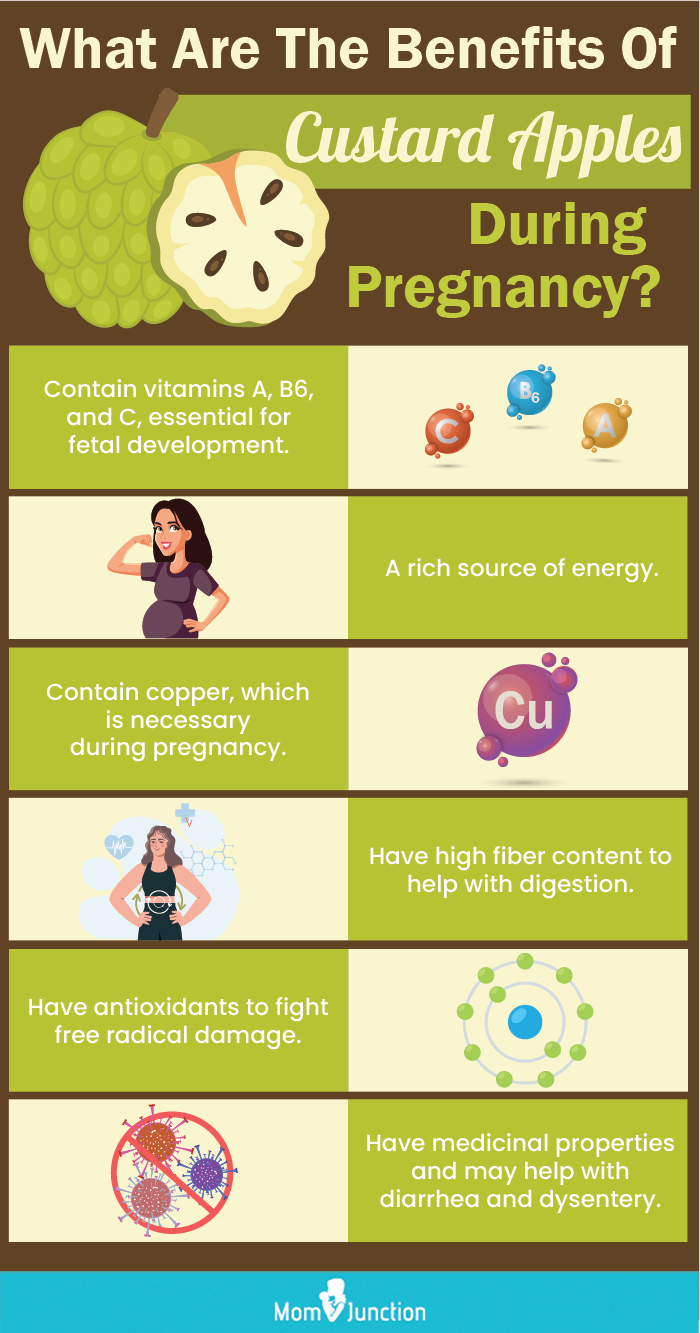
Illustration: Custard Apple (Sitaphal) During Pregnancy: Benefits & Recipes
_during_pregnancy_benefits__recipes_illustration.jpg.webp)
Image: Stable Diffusion/MomJunction Design Team
References
1. Custard-Apple; Half Your Plate. CA
2. Custard Apple – The New Super Fruit Of The 21st Century; Custard Apple, Australia
3. Vitamin B6 for Morning Sickness; University of Michigan
4. Custard-apple, (bullock’s-heart), raw; Fooddata Central; USDA
5. Pregnancy and Lactation; Oregon State University
6. Pratistha Srivastava et al.; Nutritional Information of Custard Apple and Strawberry Fruit Pulp; Chemical Science Review And Letters
7. Franz KB; Magnesium intake during pregnancy.; National Center For Biotechnology Information (1987)
8. A. Jayaprakash; Phytochemicals, Antimicrobial and Antioxidant Properties of Annona reticulata Linn.; Journal of Academia and Industrial Research (JAIR)
9. Tatiana Uchôa Passos; Glycemic index and glycemic load of tropical fruits and the potential risk for chronic diseases; Researchgate
10. Yogendra Singh et al.; A review on insight of immense nutraceutical and medicinal potential of custard apple (Annona squamosa Linn.); International Journal of Chemical Studies (2019)
11. Anamaria Cozma-Petruţ, Felicia Loghin, Doina Miere, and Dan Lucian Dumitraşcu;Diet in irritable bowel syndrome: What to recommend, not what to forbid to patients!; National Library of Medicine (2017)
Community Experiences
Join the conversation and become a part of our nurturing community! Share your stories, experiences, and insights to connect with fellow parents.
Read full bio of Dr. Shikha Sharma

Dr. Tan Poh Kok (PK Tan) is a senior consultant obstetrician and gynecologist at PK Women’s Specialist Centre in Singapore. He got trained at the National University of Singapore and the Royal College of Obstetricians and Gynaecology in the UK. Dr. Tan specializes in women’s health issues, including endometriosis, ovarian cysts, cervical cancer, fertility problems, and uro-gynecology.
Dr. Tan Poh Kok (PK Tan) is a senior consultant obstetrician and gynecologist at PK Women’s Specialist Centre in Singapore. He got trained at the National University of Singapore and the Royal College of Obstetricians and Gynaecology in the UK. Dr. Tan specializes in women’s health issues, including endometriosis, ovarian cysts, cervical cancer, fertility problems, and uro-gynecology.
Read full bio of Swati Patwal
Read full bio of Rebecca Malachi
Read full bio of Aneesha Amonz
















